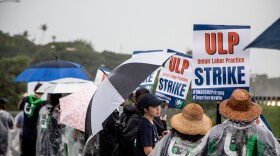State health officials report an uptick in whooping cough cases — the highest in a decade. As of July 31, just over 200 cases have been confirmed.
The disease is also known as pertussis, and health officials urge the public to consider vaccination as a way to reduce the risk of hospitalization and even death.
Cases are highest on Hawaiʻi Island, and rates are rising on Kauaʻi. Most of the people who have come down with the illness have been unvaccinated or have an unknown vaccination status. The Department of Health confirmed there have been several hospitalizations.
Ron Balajadia is the immunization branch chief at the Hawaiʻi Department of Health. He spoke with The Conversation about the ongoing outbreak, and shared advice as students head back to school.
Interview highlights
On reducing the spread of whooping cough or other respiratory diseases
RON BALAJADIA: If anybody's been coughing for two, three weeks, prolonged coughing and just continuous coughing, we call that paroxysms, where just continuous coughing, those are the signs. And by that time, it's kind of sort of already too late, because you've already most likely infected or spread the bacteria to other people. And so the goal, hopefully, is that we get people to truly realize that this is something that is part of our community, and it is passed from person to person. The message is really to make people understand, get vaccinated, get up to date. But I think part of helping out, besides getting the vaccine and getting vaccinated and up to date, is when you're coughing, cover your coughs. Don't spread germs, and it doesn't even have to be pertussis, it could be the cold, it could be any other respiratory diseases that we have. So eliminate or minimize the spread of that cough, of those microorganisms, and we can definitely help in minimizing the spread of those particular diseases.

On current whooping cough cases and Hawaiʻi’s vaccination rates
BALAJADIA: Prior to COVID, we were averaging around maybe 46 cases a year. It fluctuated from as high as 50-something to as low as maybe 30-something. So we knew we had it in the community, but it wasn't as rampant as we're seeing now. Well, certainly with COVID, a lot of people then started not getting vaccinated, or being misinformed about the COVID vaccine in particular, and then sadly, has been attributed to other routine vaccinations that we've been really good at vaccinating our community, our young kids and everyone else. And I feel that sometimes that particular pandemic created opportunities for people to not get or question vaccines overall, and not get vaccinated. And so then you have a pool of individuals that are what we consider susceptible, meaning that they can get the disease. And as the years pass on, that number grows. And so when a disease like pertussis or anything else, like measles as an example in the continental U.S., those things can spread rapidly in a community that doesn't have a strong or as well-vaccinated community, and so I think that's where we're seeing right now.

BALAJADIA: The rates right now, the numbers that we have for kindergarteners, dip below 90%, and we're slowly rising a little bit close to 90% for the kindergarten population. We would like to get that higher, like everything else, at least 95% or above. And again, like I mentioned before, the Department of Health and your private doctor can't do all the work. We really need everybody else, the community and others to make sure that they're coming in and getting vaccinated, especially their kids.
On public health knowledge
BALAJADIA: Get up to date on your vaccinations. It doesn't matter what age you are. Talk to your doctors, your providers. Ask them questions on if you're eligible or do you have your vaccines up to date. If you are sick, don't spread your germs; cover your coughs. It's really important that you make sure that you don't spread it to other individuals. There's a lot of susceptible individuals in our community. Oftentimes we don't know if they are, so they're at highest risk. I think one of the things we always say is, let's spread aloha, not germs.
This story aired on The Conversation on Aug. 14, 2025. The Conversation airs weekdays at 11 a.m. Hannah Kaʻiulani Coburn adapted this interview for the web.





